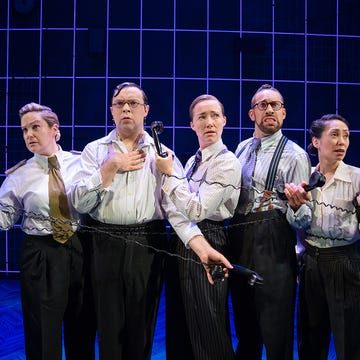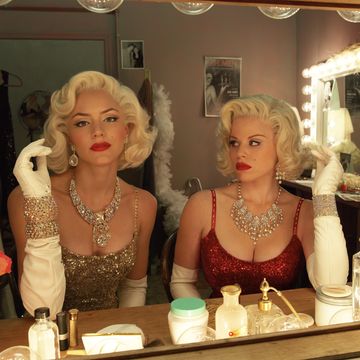It won’t be easy, but let’s set George Clooney aside for a moment. The matinee-handsome, Oscar-winning, well-married father of twins is currently making his Broadway debut as America’s most iconic broadcaster, Edward R. Murrow, in a play he originally penned as a film with his longtime partner Grant Heslov.
In the 2005 film version Clooney played Murrow’s producer, Fred W. Friendly, while David Strathairn got a much deserved Oscar nod as Murrow. Clooney recently told the New York Times’s Maureen Dowd that he had planned to play Murrow the first time around but felt, after the first table read, that he lacked the gravitas to pull it off. Twenty years later, at 63, he is betting that has changed and has even dyed his famous silver locks to a Murrow shade of brown.
Yes, I say, set him aside for a moment because even if George Clooney had nothing to do with Good Night, and Good Luck (which takes its name from Murrow’s famous signoff), it is a play everyone should see, stuffed with relevance for this moment—despite the fact the play focuses on a CBS News broadcast that aired 70 years ago, before most of the audience at the Winter Garden Theatre was born.
The play digs into a March 9,1954, report Murrow and Friendly did on CBS’s See It Now in the midst of Joe McCarthy’s red-baiting, blacklisting rampages, which relied primarily on McCarthy’s own words. While the reports were not the first time journalists had attacked McCarthy, that broadcast landed a decisive blow, as the public saw for itself how McCarthy badgered witnesses and manipulated half-truths for his own purposes. Was it mere coincidence that two days after the report aired, the U.S. Army accused McCarthy and a top aide, Roy Cohn, of inappropriate behavior, which led to his ultimate downfall? (Or a coincidence that Cohn was also an early mentor of the current President?) The playwrights appear to think not.
W. Joseph Campbell, in his book Getting It Wrong, suggests that there has been much mythmaking around the Murrow-Friendly broadcast, pointing out that they were not the first or the only journalists calling McCarthy to account, nor was their broadcast the sole reason for his demise. (Murrow, for his part, never claimed the CBS reports were the cause of McCarthy’s downfall.) Campbell points to Drew Pearson, who lost the sponsor for his radio show after writing in his nationally syndicated newspaper column that McCarthy’s claim that there were “scores” of communists in the U.S. State Department was untrue, noting that McCarthy was able to produce the names of only four State Department workers, two of whom had resigned years earlier. Among other things.
Campbell also cites a “bare-knuckled” 17-part series published in 1951 in the then liberal-leaning New York Post: “The closing installment likened the hard-drinking McCarthy to ‘a drunk at a party who was funny half an hour ago but now won’t go home.’”
Writing recently in the New Republic, A. Brad Schwartz makes this observation: “Seventy years after the McCarthy broadcast, we should remember Murrow not for the mythological notion that he single-handedly brought down a demagogue but for understanding and combatting the conditions that empower all demagogues… Murrow’s example teaches that in order to rebuild public trust in the news media and other American institutions, today’s journalists cannot simply be democracy’s chroniclers or watchdogs—they must also be its advocates and defenders.”
There is no doubt that it took considerable courage for Murrow and Friendly to go after McCarthy on national television. A Gallup poll before the broadcast indicated that 46% of the American people approved of McCarthy’s efforts, and McCarthy and his supporters were known to go hard after any detractors. Murrow and Friendly weren’t just risking their livelihoods and reputations but also those of all those at the network. The decision to go forward was not theirs alone. They needed the permission of CBS founder William S. Paley, and they got it, if somewhat grudgingly.
So where are today’s Murrows and Friendlys? And Paleys, for that matter?
Marvin Kalb is Murrow professor emeritus at Harvard and a former CBS correspondent who was recruited by Murrow himself, the last of the so-called “Murrow boys.” Writing recently in the Boston Globe, Kalb’s answer to that question is disheartening.
“Is there a journalist today who can challenge President Trump as Edward R. Murrow did Senator Joseph McCarthy and emerge as a triumphant hero of truth over lies, fact over falsehood?,” Kalb writes. “It doesn’t seem likely. Few media outlets have the courage to hire another Murrow. Many newsrooms today live in fear of antagonizing a president clearly on the warpath against any criticism, justifiable or not. Is the United States then slipping into an authoritarian form of governance? Murrow’s answer would have been a resounding ‘yes.’”
And that is why Good Night, and Good Luck, which opened April 3, is more than entertainment, more than a history lesson, more than a star turn for Clooney. It is, with apologies for the obvious pun, a playbook for those who wish to challenge the way President Trump uses fear, not unlike McCarthy, to get what he wants and silence those who get in his way. Fear freezes opposition. Fear silences dissent. Fear permits the growth of a malignancy that threatens the institutions upon which our government depends. And as was the case with McCarthy, about half the country applauds the president while the other half looks for a rallying cry to stop him. Certainly the audience that attended the first night of previews whooped and applauded every time a line from the past resonated with the crisis of the moment. “It’s as if all the reasonable people took a plane to Europe,” says one character to loud approval.
I confess to feeling an uncommon connection to the play. Over the years I’ve interviewed Clooney a couple of times. Once at the start of his movie career in 1997, when he was still on ER and making his ill-fated appearance in Joel Schumacher’s Batman and Robin, and again in 2005, when he won an Oscar for his role as a CIA agent in Syriana. Both times he was professional, self-effacing, and funny as hell.
But my deepest connection to the play is this: I once worked for Fred Friendly, and that brought Clooney, Heslov, and me together at Columbia University in 2005 for a standing-room-only panel discussion about the movie version of Good Night and Good Luck. I found myself unpleasantly tongue-tied that night, making the beginner’s mistake of trying to be as charming as Clooney. I was not.
I worked for Fred for nearly a decade beginning in the early 1980s, long after his days with Murrow. By then he had only grown in stature and confidence, having gone on to become president of CBS News and, by the time I knew him, the Edward R. Murrow Professor of Journalism at Columbia University, as well as producer of programs on ethics and other thorny topics for PBS.
I once asked Fred if it was true that when CBS correspondent Roger Mudd told him he wanted to stay in DC and not go to Vietnam, Fred was so angry he threw a chair against the wall. “Completely false!” Fred bellowed. “It was a desk, and I left the hole it made in my office wall as a reminder.”
By that point Fred was throwing verbal desks, not actual ones. He was a haystack of a man, towering over everyone in the room both in size and the velocity of his passions. His voice had a certain sonic boom quality, though when he was truly angry it lowered to a whisper. He was not always the world’s best listener, but he was committed to fighting for what he believed in. He was relentless, driven by a sense of purpose.
Nonetheless, Fred saw himself as Murrow’s junior partner, and he credited Murrow for being willing to subject himself personally to McCarthy’s wrath by airing the story. I will not spoil for you the ways the play tells the tale except to say it is not an overzealous actor playing McCarthy, it is McCarthy himself from the newsreels of the time.
As for Murrow, the playwrights wisely borrow heavily from his actual words. Clooney, as Murrow, looks straight into the onstage camera, saying, “We must not confuse dissent with disloyalty. We must remember always that accusation is not proof and that conviction depends upon evidence and due process of law.
“We will not walk in fear of one another. We will not be driven by fear into the age of unreason, if we dig deep in our history and our doctrine, and remember that we are not descended from fearful men—not from men who feared to write, to speak, to associate, and to defend causes that were, for the moment, unpopular.
“This is no time for men who oppose Senator McCarthy’s methods to keep silent, or for those who approve. We can deny our heritage and our history, but we cannot escape responsibility for the result. There is no way for a citizen of a republic to abdicate his responsibilities…
“The actions of the junior senator from Wisconsin have caused alarm and dismay amongst our allies abroad, and given comfort to our enemies. And whose fault is that? Not really his. He didn’t create this situation here; he merely exploited it—and rather successfully. Cassius was right. ‘The fault, dear Brutus, is not in our stars, but in ourselves.’”
It was a matter of conscience, Fred always said, that propelled him and Murrow. They felt they had no choice but to tell it as they saw it. For the good of the country. And it is clear George Clooney, the son of a journalist, feels the same way.
Clooney has stuck his neck out before, writing a New York Times op-ed urging President Biden to step aside. There will be those who say, as they did then, that Clooney should “stick to acting,” but I don’t think that is what Murrow and Friendly would say. I think they would say, “Thank God for fearless men.”
Cynthia McFadden was formerly a co-anchor of ABC’s Nightline and the senior investigative and legal correspondent at NBC. Her work has been recognized with a host of broadcasting’s most prestigious awards including numerous Emmys, two Peabodys, and the Edward R. Murrow Award for hard news.


















